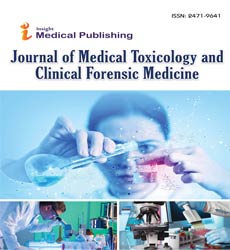Toxicology in Geriatric Patients: Challenges and Considerations for Treatment
Elena Tobolkina
Department of Toxicology, University of Lausanne, Lausanne, Switzerland
Published Date: 2023-06-15DOI10.36648/ 2471-641.9.2.56
Elena Tobolkina*
Department of Toxicology, University of Lausanne, Lausanne, Switzerland
- *Corresponding Author:
- Elena Tobolkina
Department of Toxicology,
University of Lausanne, Lausanne,
Switzerland,
E-mail: Tobolkina_e@uls.sw
Received date: May 15, 2023, Manuscript No. IPJMTCM-23-17580; Editor assigned date: May 17, 2023, Pre QC No. IPJMTCM-23-17580 (PQ); Reviewed date: May 29, 2023, QC No. IPJMTCM-23-17580; Revised date: June 08, 2023, Manuscript No. IPJMTCM-23-17580(R); Published date: June 15, 2023, DOI: 10.36648/ 2471-641.9.2.56.
Citation: Tobolkina E (2023) Toxicology in Geriatric Patients: Challenges and Considerations for Treatment. J Med Toxicol Clin Forensic: Vol.9 No. 2:56.
Description
Toxicology in geriatric patients presents unique challenges and considerations due to the physiological changes that occur with aging. Geriatric patients are more susceptible to the effects of toxic substances, and their response to poisoning may differ from that of younger individuals. Understanding these challenges is crucial for providing appropriate and effective treatment in cases of toxic exposure in the elderly population. Liver function tends to decline with age, leading to reduced drug metabolism and detoxification capacity. This can result in prolonged exposure to toxic substances and an increased risk of toxicity. Kidney function also declines with age, affecting the excretion of toxic substances. Impaired renal clearance may lead to a longer duration of exposure to toxins and an increased risk of accumulation. Aging is associated with changes in body composition, with a decrease in lean body mass and an increase in fat mass. As many toxic substances are lipophilic (fat-soluble), they may accumulate in fatty tissues and have a prolonged effect on the body. The blood-brain barrier, which protects the brain from potentially harmful substances, may become more permeable with age, allowing certain toxicants to enter the brain more easily. Geriatric patients often have multiple coexisting medical conditions, which can complicate the diagnosis and management of poisoning cases. Geriatric patients may present with atypical or nonspecific symptoms of poisoning, making diagnosis more challenging. Symptoms such as confusion, falls, and altered mental status may be attributed to other medical conditions or age-related change.
Treatment of Poisoning Cases
Geriatric patients frequently take multiple medications, increasing the risk of drug-drug interactions and potential toxicity. Poisoning cases may involve the inadvertent ingestion of medications due to confusion or forgetfulness. Slower drug elimination in geriatric patients may require prolonged monitoring and supportive care during the treatment of poisoning cases. Geriatric patients often have comorbidities and take medications for various chronic conditions. Toxicity may result from drug interactions or inappropriate medication use. Patients with cognitive impairment, such as dementia, may be unable to provide a reliable history of toxic exposure, complicating the diagnosis. Geriatric patients may be frail and more susceptible to adverse effects of certain toxic substances, necessitating cautious dosing and management. Geriatric patients may take longer to respond to treatment due to physiological changes and reduced organ function. The management of toxicology cases in geriatric patients requires a multidisciplinary approach, involving toxicologists, emergency physicians, pharmacists, and geriatric specialists. Prompt recognition of toxic exposures and poisoning is essential for initiating appropriate treatment. Providing supportive care, including monitoring vital signs, hydration, and organ function, is crucial during the management of poisoning cases in geriatric patients. Adjusting drug doses based on renal and hepatic function is essential to prevent drug accumulation and toxicity. Administering specific antidotes, when available, may be necessary to counteract the effects of certain toxic substances. Consultation with specialists in geriatric medicine and pharmacology can help guide treatment decisions, considering the patient's specific health status and medication regimen. Educating patients and caregivers about medication safety, poison prevention, and the importance of proper drug management can help reduce the risk of toxic exposures in geriatric patients. Toxicology in geriatric patients poses unique challenges due to age-related physiological changes, comorbidities, and polypharmacy. A thorough understanding of these considerations is vital for timely and appropriate management of poisoning cases in the elderly population. Collaboration among healthcare professionals and tailored treatment strategies can help improve outcomes and reduce the impact of toxic exposures on geriatric patients. Drug dosing refers to the process of determining the appropriate amount of a medication that should be given to a patient to achieve the desired therapeutic effect while minimizing the risk of adverse effects. Proper drug dosing is essential to ensure the safety and effectiveness of medications in treating various medical conditions. The age, weight, gender, and overall health status of the patient can influence drug dosing. For example, geriatric patients and pediatric patients may require adjustments in dosing due to age-related physiological changes. The function of the kidneys and liver is critical in the metabolism and elimination of many drugs. Impaired renal or hepatic function may require dosage adjustments to prevent drug accumulation and toxicity. Genetic variations can affect how individuals metabolize drugs, leading to differences in drug response and the need for personalized dosing. Some drugs can interact with each other, leading to altered drug metabolism or increased risk of adverse effects.
Renal and Hepatic Function
Dosage adjustments may be necessary when multiple medications are prescribed. Certain medical conditions may alter drug metabolism and affect the way drugs are distributed and eliminated in the body. Dosage adjustments may be needed to account for these changes. Standard dosing refers to using the recommended dosage for a particular drug based on the patient's age, weight, and condition. This dosing is typically appropriate for patients with normal renal and hepatic function. Some medications are dosed based on the patient's body weight, especially in pediatrics, where precise dosing is critical. Titration involves starting a drug at a low dose and gradually increasing it until the desired therapeutic effect is achieved or until the maximum tolerated dose is reached. For certain medications with a narrow therapeutic window, therapeutic drug monitoring involves measuring drug levels in the blood to ensure they are within the optimal range for effectiveness and safety. Individualized dosing takes into account specific patient characteristics, such as genetics and drug metabolism, to tailor the dosage to the individual's needs. A loading dose is a higher initial dose of a medication given to rapidly achieve therapeutic levels in the body. It is often followed by maintenance dosing. Managing multiple medications in a patient can increase the risk of drug interactions and adverse effects, requiring careful consideration of drug dosing. Incorrect drug dosing can result in medication errors, leading to adverse drug reactions or treatment inefficacy. Limited data on drug dosing in certain populations, such as pregnant women or individuals with rare diseases, can make dosing decisions challenging. Some medications may require dosage adjustments over time as patients develop tolerance or sensitivity to the drug. Individualized drug dosing is essential to optimize drug therapy for each patient. Healthcare professionals should consider patient-specific factors, such as age, weight, kidney and liver function, and genetics, when determining the appropriate drug dosage. Regular monitoring and evaluation of drug response can help identify the need for dosage adjustments and improve patient outcomes. In conclusion, drug dosing is a critical aspect of medication management, aiming to achieve therapeutic effectiveness while minimizing the risk of adverse effects. Individualized dosing, based on patient characteristics and specific clinical situations, is crucial for safe and effective drug therapy. Regular assessment and communication between healthcare providers and patients are essential to ensure optimal treatment outcomes.

Open Access Journals
- Aquaculture & Veterinary Science
- Chemistry & Chemical Sciences
- Clinical Sciences
- Engineering
- General Science
- Genetics & Molecular Biology
- Health Care & Nursing
- Immunology & Microbiology
- Materials Science
- Mathematics & Physics
- Medical Sciences
- Neurology & Psychiatry
- Oncology & Cancer Science
- Pharmaceutical Sciences
